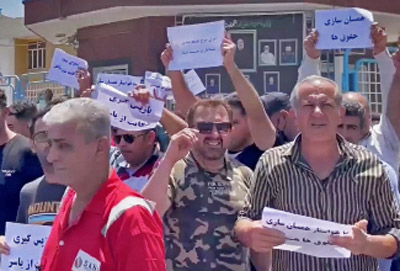More than 20,000 oil project contract workers are on strike at over 100 worksites in Iran, demanding higher wages and better working conditions. The strike began June 20, a week before the country’s presidential election. In a sign of the Iranian regime’s declining support, some 60% of those eligible to vote boycotted the first round of the election. A runoff between the two highest-polling candidates is set for July 5.
Hundreds of thousands of oil project workers employed by contractors — including pipefitters, welders and scaffolders — are paid substantially less than workers employed directly by the oil companies.
“There should be equal wages and working conditions for equal work,” the Organizing Council of Oil Contract Workers said on the first day of the strike.
The workers are demanding the dismantling of the contract system and that they be hired directly by the companies; an immediate 35% wage increase “considering that inflation is 45%”; 14 days off after working 14 days in a row, what they call “14-14”; and “improvement of dormitory conditions, food quality and workplace safety.”
At some sites the contractors have threatened to fire striking workers “or to pay more wages to get new workers to do the unfinished work left on the ground. But no one is willing,” the Organizing Council said June 27.
The oil project workers often spend weeks at work camps in the desert and remote areas. “Being away from our families is one of the reasons for family breakdowns,” Nozar, a striking pipefitter in the Asaluyeh region, told Etehad, an online publication of the Free Union of Iranian Workers, underscoring the importance of 14-14. “By achieving this demand, families will become more stable.”
Despite the fact that the bourgeois clerical regime blocks the formation of independent unions, the strikes “span a wide geographical area without any formal workers’ organizations,” Etehad notes. This is not the first time these workers have gone on strike.
Each year they have made progress, Nozar said, getting some wage increases and more days off.
The Iranian Labor News Agency wrote about the struggle in the oil fields July 1, noting that there have been “many rallies.” Although it didn’t mention the strike, it interviewed Maziar Gilaninejad, who is involved in the current fight.
He noted, “Sometimes the dormitories do not have air conditioners and are full of insects. Sometimes they don’t even have a toilet.
“Why should one worker work under an air conditioner and rest in a clean room and have satellite TV and get good money, while another worker, despite 12-hour days in the worst conditions and living in dirty dormitories, gets paid less?” he asked.
The contractors often pocket money that is supposed to go for workers’ social security retirement, he said, as well as some of the money the companies pay that is supposed to go for decent food. And they’re late paying wages.
The strike is winning support in Iran and internationally. The IndustriALL Global Union; National Union of Rail, Maritime and Transport Workers in the U.K.; and the Mining and Energy Union of Australia have sent solidarity messages to the striking workers.
At the same time, working people and political prisoners have been campaigning for the abolition of the death penalty, one of the tools the bourgeois clerical regime uses to terrorize workers and oppressed nationalities.
The Organizing Council of Oil Contract Workers has demanded abolition of the death penalty.
In the wake of the protests that rocked Iran after the death of Zhina Amini, a young Kurdish woman who died following her arrest by the “morality” police in September 2022, the regime stepped up the use of the death penalty.
According to Amnesty International, the Iranian government put to death at least 853 people in 2023, the highest number in the world except for China. That’s up from 576 in 2022 and 314 in 2021.
Most of the executions in Iran are for alleged drug offenses. Those killed are disproportionately Kurds, Baluch, Arabs and other oppressed nationalities.
In June, Iran’s Supreme Court overturned the death sentence of Toomaj Salehi, a well-known rapper who was imprisoned and charged with “corruption on earth” for songs criticizing government repression and supporting the protests after the death of Amini. The decision was made following national and international protests in his defense.
The fight is far from over. At least 15 political prisoners have recently been accused of “armed rebellion,” and could face execution. A “Black Tuesdays. No to Executions!” campaign organizes one-day hunger strikes by prisoners demanding the abolishment of the death penalty. They began 23 weeks ago and inmates at nine prisons are now involved.


